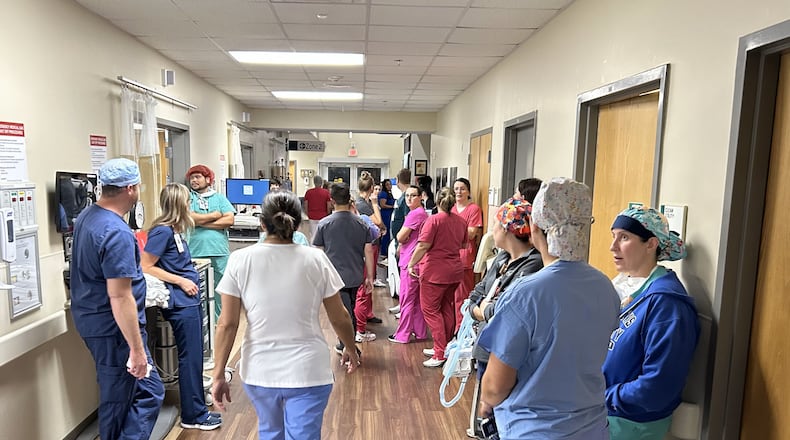In Valdosta, South Georgia Medical Center might be about the only place with power for miles around after Hurricane Helene passed right through Lowndes County on Thursday night and into Friday morning.
As the eye passed directly over the hospital, you could hear it, said emergency services director Craig Grace: the storm quieting a bit as the first eye wall passed, then roaring back as the second moved through. He and his colleague Kevin Broome, nurse manager for critical care services, were caring for patients in hallways, stretching connections to ICU machines from patient rooms and through doorways to reach the patients in the halls.
At about that time, they say, staff in the emergency department could see the car lights of a family trying to drive to the hospital but blocked by a fallen tree 200 or 300 yards away, in the hospital driveway. Grace and other nurses ran out in their scrubs to help them get in, picking up the toddler children and carrying them.
Soon, another family arrived needing help: Their house was struck by a tree, leaving a small child badly injured. Broome was part of the group running out to help them.
“I mean, the pine trees were bending like a fishing pole,” Broome said. “We were having to watch the trees and watch debris as we were bringing these patients in.” One police officer was injured while trying to help the families get past the tree. Eventually, Sheriff’s deputies got equipment to move the tree out of the hospital driveway.
Credit: South Georgia Medical Center
Credit: South Georgia Medical Center
As they dealt with the patients who straggled in or were rescued, the 285-bed facility operated on backup power generators.
And for a few eerie minutes in the middle of the night, one of those wasn’t working. As regular electricity lines fell, one of the building’s three generators flickered off — the one that powers the main hospital’s emergency room and the laboratories.
Emergency batteries within the ER’s lights and medical machines kicked in, so the hospital could keep providing care while the facilities staff raced to assess the generators and finally get them back up, hospital CEO Ronald Dean said.
Dean said he has been told the winds that hit the hospital last night were at times over 100 mph.
“And our team was in-house, taking care of patients,” he said. “Uninterrupted.”
About 200 nurses, building mechanics, doctors and other workers had come in before the storm to be sure they could keep the hospital working if roads became blocked, he said — workers who left their own homes and families behind to care for patients.
That work meant pulling patients away from the windows beforehand and caring for them in hallways as the storm crashed through. Patients’ families were with them too, Dean recalled. And Dean was in the hospital as well. He said he got a 30-minute nap, resting his head on his desk around 4 a.m.
“It was incredible to see how well they were doing it,” Dean said. “And right now we’re still working through this thing, right? You know, we’re, people are trying to get home to see what their houses look like.”
One of South Georgia Medical Center’s satellite hospitals in Lakeview lost its generator power and might be operating on batteries, Dean said Friday afternoon. The small hospital has about 11 patients.
Part of the emergency response is working through confused early reports to get clear information. Reports got to Gov. Brian Kemp that South Georgia Medical Center was completely without power, although the hospital always had generator power, and Kemp initially highlighted the concern in his Friday remarks to the media.
“We are trying to get to individuals in facilities with critical things going on, like hospitals without power,” Kemp said in his emergency briefing. “Our priority is getting to medical emergencies and facilities like hospitals, nursing homes and others that need critical help and don’t have power.”
U.S. Secretary of Health and Human Services Xavier Becerra on Friday declared a public health emergency for Georgia and other states affected by Helene. In a news release, HHS and the Administration for Strategic Preparedness and Response said they will find and assist Medicaid and Medicare recipients in hard-hit areas who rely on electricity-dependent medical equipment — such as oxygen or dialysis. They will also assist hospitals, nursing homes, dialysis centers and other health care facilities.
An hour north of Valdosta, Tift Regional Medical Center in Tifton also kept operating through the storm, said Chris Efaw, a vice president with the health system. Both Dean and Efaw pointed out that hospital workers were not only caring for patients impacted by the storm, but they were themselves locals with families and homes impacted by the storm.
Tift was at capacity Friday, dealing with its own critical patient load and not able to take transfers of other hospitals’ ICU patients.
Of the 181 beds the Tifton hospital is licensed to operate, “we have enough staffing to cover 130 beds,” Efaw said.
Staff writer Caleb Groves contributed to this report.
About the Author
Keep Reading
The Latest
Featured





